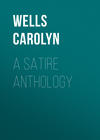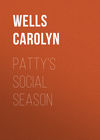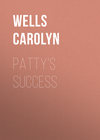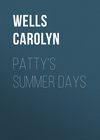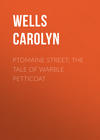Kitabı oku: «A Satire Anthology», sayfa 11
Yazı tipi:
NOTHING TO WEAR
MISS Flora McFlimsey, of Madison Square,
Has made three separate journeys to Paris;
And her father assures me, each time she was there,
That she and her friend Mrs. Harris
(Not the lady whose name is so famous in history,
But plain Mrs. H., without romance or mystery)
Spent six consecutive weeks without stopping,
In one continuous round of shopping;
Shopping alone, and shopping together,
At all hours of the day and in all sorts of weather;
For all manner of things that a woman can put
On the crown of her head or the sole of her foot,
Or wrap round her shoulders, or fit round her waist,
Or that can be sewed on, or pinned on, or laced,
Or tied on with a string, or stitched on with a bow,
In front or behind, above or below;
For bonnets, mantillas, capes, collars, and shawls;
Dresses for breakfasts, and dinners, and balls;
Dresses to sit in, and stand in, and walk in,
Dresses to dance in, and flirt in, and talk in;
Dresses in which to do nothing at all;
Dresses for winter, spring, summer, and fall —
All of them different in colour and pattern,
Silk, muslin, and lace, crape, velvet, and satin,
Brocade, and broadcloth, and other material
Quite as expensive and much more ethereal:
In short, for all things that could ever be thought of,
Or milliner, modiste, or tradesman be bought of,
From ten-thousand-francs robes to twenty-sous frills;
In all quarters of Paris, and to every store,
While McFlimsey in vain stormed, scolded, and swore,
They footed the streets, and he footed the bills.
The last trip, their goods shipped by the steamer Argo,
Formed, McFlimsey declares, the bulk of her cargo,
Not to mention a quantity kept from the rest,
Sufficient to fill the largest-sized chest,
Which did not appear on the ship’s manifest,
But for which the ladies themselves manifested
Such particular interest that they invested
Their own proper persons in layers and rows
Of muslins, embroideries, worked underclothes,
Gloves, handkerchiefs, scarfs, and such trifles as those;
Then, wrapped in great shawls, like Circassian beauties,
Gave good-by to the ship, and go-by to the duties.
Her relations at home all marvelled, no doubt,
Miss Flora had grown so enormously stout
For an actual belle and a possible bride;
But the miracle ceased when she turned inside out,
And the truth came to light, and the dry-goods beside,
Which, in spite of collector and custom-house sentry,
Had entered the port without any entry.
And yet, though scarce three months have passed since the day
This merchandise went, on twelve carts, up Broadway,
This same Miss McFlimsey, of Madison Square,
The last time we met, was in utter despair,
Because she had nothing whatever to wear!
Nothing To Wear! Now, as this is a true ditty,
I do not assert – this you know is between us —
That she’s in a state of absolute nudity,
Like Powers’s Greek Slave, or the Medici Venus,
But I do mean to say I have heard her declare,
When at the same moment she had on a dress
Which cost five hundred dollars, and not a cent less,
And jewelry worth ten times more, I should guess,
That she had not a thing in the wide world to wear!
I should mention just here, that out of Miss Flora’s
Two hundred and fifty or sixty adorers,
I had just been selected as he who should throw all
The rest in the shade, by the gracious bestowal
On myself, after twenty or thirty rejections,
Of those fossil remains which she called her “affections,”
And that rather decayed but well-known work of art,
Which Miss Flora persisted in styling “her heart.”
So we were engaged. Our troth had been plighted
Not by moonbeam or starbeam, by fountain or grove,
But in a front parlour, most brilliantly lighted,
Beneath the gas-fixtures we whispered our love —
Without any romance, or raptures, or sighs,
Without any tears in Miss Flora’s blue eyes,
Or blushes, or transports, or such silly actions;
It was one of the quietest business transactions,
With a very small sprinkling of sentiment, if any,
And a very large diamond imported by Tiffany.
On her virginal lips while I printed a kiss,
She exclaimed, as a sort of parenthesis,
And by way of putting me quite at my ease,
“You know, I’m to polka as much as I please,
And flirt when I like – now stop – don’t you speak —
And you must not come here more than twice in the week,
Or talk to me either at party or ball,
But a’ways be ready to come when I call:
So don’t prose to me about duty and stuff —
If we don’t break this off, there will be time enough
For that sort of thing; but the bargain must be,
That as long as I choose I am perfectly free:
For this is a sort of engagement, you see,
Which is binding on you, but not binding on me.”
Well, having thus wooed Miss McFlimsey, and gained her,
With the silks, crinolines, and hoops that contained her,
I had, as I thought, a contingent remainder
At least in the property, and the best right
To appear as its escort by day and by night;
And it being the week of the Stuckups’ grand ball —
Their cards had been out for a fortnight or so,
And set all the Avenue on the tiptoe —
I considered it only my duty to call
And see if Miss Flora intended to go.
I found her – as ladies are apt to be found
When the time intervening between the first sound
Of the bell and the visitor’s entry is shorter
Than usual – I found – I won’t say I caught – her
Intent on the pier-glass, undoubtedly meaning
To see if perhaps it didn’t need cleaning.
She turned as I entered. “Why, Harry, you sinner,
I thought that you went to the Flashers’ to dinner!”
“So I did,” I replied; “but the dinner is swallowed,
And digested, I trust; for ’tis now nine or more:
So being relieved from that duty, I followed
Inclination, which led me, you see, to your door.
And now will your Ladyship so condescend
As just to inform me if you intend
Your beauty and graces and presence to lend
(Al’ of which, when I own, I hope no one will borrow)
To the Stuckups, whose party, you know, is to-morrow?”
The fair Flora looked up with a pitiful air,
And answered quite promptly, “Why, Harry, mon cher,
I should like above all things to go with you there;
But really and truly, I’ve nothing to wear.”
“Nothing to wear? Go just as you are:
Wear the dress you have on, and you’ll be by far,
I engage, the most bright and particular star
On the Stuckup horizon.” I stopped, for her eye,
Notwithstanding this delicate onset of flattery,
Opened on me at once a most terrible battery
Of scorn and amazement. She made no reply,
But gave a slight turn to the end of her nose
(That pure Grecian feature), as much as to say,
“How absurd that any sane man should suppose
That a lady would go to a ball in the clothes,
No matter how fine, that she wears every day!”
So I ventured again, “Wear your crimson brocade.”
(Second turn-up of nose). “That’s too dark by a shade.”
“Your blue silk.” “That’s too heavy.” “Your pink – ” “That’s too light.”
“Wear tulle over satin.” “I can’t endure white.”
“Your rose-coloured, then, the best of the batch.”
“I haven’t a thread of point lace to match.”
“Your brown moire-antique.” “Yes, and look like a Quaker.”
“The pearl-coloured – ” “I would, but that plaguy dressmaker
Has had it a week.” “Then that exquisite lilac,
In which you would melt the heart of a Shylock.”
(Here the nose took again the same elevation):
“I wouldn’t wear that for the whole of creation.”
“Why not? It’s my fancy, there’s nothing could strike it
As more comme il faut.” “Yes, but, dear me, that lean
Sophronia Stuckup has got one just like it,
And I won’t appear dressed like a chit of sixteen.”
“Then that splendid purple, that sweet mazarine,
That superb point d’aiguille, that imperial green,
That zephyr-like tarlatan, that rich grenadine – ”
“Not one of all which is fit to be seen,”
Said the lady, becoming excited and flushed.
“Then wear,” I exclaimed, in a tone which quite crushed
Opposition, “that gorgeous toilette which you sported
In Paris last spring, at the grand presentation,
When you quite turned the head of the head of the nation;
And by all the grand court were so very much courted.”
The end of the nose was portentously tipped up,
And both the bright eyes shot forth indignation,
As she burst upon me with the fierce exclamation,
“I have worn it three times at the least calculation,
And that and most of my dresses are ripped up!”
Here I ripped out something, perhaps rather rash —
Quite innocent, though; but, to use an expression
More striking than classic, it “settled my hash,”
And proved very soon the last act of our session.
“Fiddlesticks, is it, sir? I wonder the ceiling
Doesn’t fall down and crush you! Oh, you men have no feeling.
You selfish, unnatural, illiberal creatures,
Who set yourselves up as patterns and preachers,
Your silly pretence – why, what a mere guess it is!
Pray, what do you know of a woman’s necessities?
I have told you and shown you I’ve nothing to wear,
And it’s perfectly plain you not only don’t care,
But you do not believe me” (here the nose went still higher):
“I suppose, if you dared, you would call me a liar.
Our engagement is ended, sir – yes, on the spot;
You’re a brute, and a monster, and – I don’t know what.”
I mildly suggested the words Hottentot,
Pickpocket, and cannibal, Tartar, and thief,
As gentle expletives which might give relief;
But this only proved as a spark to the powder,
And the storm I had raised came faster and louder;
It blew, and it rained, thundered, lightened, and hailed
Interjections, verbs, pronouns, till language quite failed
To express the abusive, and then its arrears
Were brought up all at once by a torrent of tears;
And my last faint, despairing attempt at an obs-
Ervation was lost in a tempest of sobs.
Well, I felt for the lady, and felt for my hat, too,
Improvised on the crown of the latter a tattoo,
In lieu of expressing the feelings which lay
Quite too deep for words, as Wordsworth would say;
Then, without going through the form of a bow,
Found myself in the entry – I hardly knew how —
On doorstep and sidewalk, past lamp-post and square,
At home and up-stairs, in my own easy chair;
Poked my feet into slippers, my fire into blaze,
And said to myself, as I lit my cigar:
Supposing a man had the wealth of the Czar
Of the Russias to boot, for the rest of his days,
On the whole, do you think he would have much to spare
If he married a woman with nothing to wear?
William Allen Butler.
A REVIEW
THE INN ALBUM, BY ROBERT BROWNING
WHAT’S this, a book? 16mo. Osgood’s page,
Fair, clear, Olympian-typed, and save a scant
O’ the margin, stiff i’ the hurried binding, good!
Intituled how? – “The Inn Album, Robert Browning, Author.”
Why should he not say, as well,
The Hotel Register?– cis-Atlantic term!
Nay, an he should, the action might purvey
To lower comprehensions: so not he!
Reflect, ’tis Browning! he neglects, prepense,
All forms of form: what he gives must we take,
Sweet, bitter, sour, absinthean, adipose,
Conglomerate, jellied, potted, salt, or dried,
As the mood holds him; ours is not to choose!
Well (here huge sighs be heard), commending us
To Heaven’s high mercy, let us read.
Three hours:
The end is reached; but who begins review,
Forgetful o’ beginning, with the end?
Turn back! – why, here’s a line supplies us with
Curt comment on the whole, though travesty —
“Hail, calm obliquity, lugubrious plot!..”
Yea, since obliquity the straight path is,
And Passion worships as her patron saint
The Holy Vitus, and from Language fall
The rusty chains of rhythm and harmony,
Why not exclaim, “Hail, sham obliquity!”
“Too hard,” you murmur, sweet, submissive minds?
But take a bite o’ the original pie! Set teeth,
’Ware cherry-stones, and if a herring-spine
Stick crosswise i’ the throat, go gulp, shed tears,
But blame us not! So runs the opening:
…
This bard’s a Browning! there’s no doubt of that;
But, ah, ye gods, the sense! Are we so sure
If sense be sense unto our common-sense,
Low sense to higher, high to low, no sense
All sense to those, all sense no sense to these?
That’s where your poet tells! and you’ve no right
(Insensate sense with sensuous thought being mixed)
To ask analysis! How can else review,
Save in the dialect of his verse, be writ?
So write we: (would we might foresee the end!)
So has he taught us, i’ “The Ring and the Book,”
De gustibus, concerning taste, non est
There’s no – disputing, disputandum (Ha!
’Tis not so difficult) – and we submit.
…
This Album-book —
“Hail, sham obliquity, lugubrious plot!” —
Is well-nigh read; you end the tangle, smash!
Here’s Browning’s recipe: take heaps o’ hate,
Take boundless love, hydraulic-pressed, in bales,
Distilments keen of baseness and of pride,
And innocence and cunning; mix ’em well,
And put a body round ’em! Add the more
O’ this, or that, you have another – stay!
The sex don’t count; make female of the male,
Male female, all the better; let them meet,
Talk, love, hate, cross, till satisfied; then, kill!
So here: lord, finding situation tough
(Between two fires, hate and a horsewhip-threat),
Writes i’ the Album, goes without and waits.
Superb One, having read, takes hand of snob,
Accepts his love till death; then lord comes back.
What did he write? “Refinement every inch,
From brow to boot-end” – ’twas a threat to tell
The country curate of his wife’s disgrace —
He, the disgracer! Snob gets wild at that,
Screams, jumps, and clutches.
All at once we see
One character dead, but how, we don’t quite know.
Then she, Superb One, writes in Album, dies
By force of will (no hint of instrument!),
Leaving the snob alone and much surprised.
Cousin is heard without; but ere the door
Opens, the story closes. Only this remains,
The last conundrum, hardly guessable
By the unbrowninged mind. Since what it means,
If aught the meaning, means some other thing,
And that thing something else, but this not that,
Nor that the other; we adopt the lines
As most expressing what we fail express,
Our solemn verdict, handkerchief and all,
Upon the book.
…
The meaning, ask you, O ingenuous soul?
Why, were there such for you, what then were left
To puzzle brain with, pump conjecture dry,
And prove you little where the poet’s great?
Great must he be, you therefore little. Go!
The curtain falls, the candles are snuffed out:
End, damned obliquity, lugubrious plot!
Bayard Taylor.
THE POSITIVISTS
LIFE and the Universe show spontaneity:
Down with ridiculous notions of Deity!
Churches and creeds are all lost in the mists;
Truth must be sought with the Positivists.
Wise are their teachers beyond all comparison,
Comte, Huxley, Tyndall, Mill, Morley, and Harrison.
Who will adventure to enter the lists
With such a squadron of Positivists?
Social arrangements are awful miscarriages;
Cause of all crime is our system of marriages.
Poets with sonnets, and lovers with trysts,
Kindle the ire of the Positivists.
Husbands and wives should be all one community,
Exquisite freedom with absolute unity.
Wedding-rings worse are than manacled wrists —
Such is the creed of the Positivists.
There was an ape in the days that were earlier;
Centuries passed, and his hair became curlier;
Centuries more gave a thumb to his wrist —
Then he was Man, and a Positivist.
If you are pious (mild form of insanity),
Bow down and worship the mass of humanity.
Other religions are buried in mists;
We’re our own Gods, say the Positivists.
Mortimer Collins.
SKY-MAKING
TO PROFESSOR TYNDALL
JUST take a trifling handful, O philosopher,
Of magic matter, give it a slight toss over
The ambient ether, and I don’t see why
You shouldn’t make a sky.
O hours Utopian which we may anticipate!
Thick London fog how easy ’tis to dissipate,
And make the most pea-soupy day as clear
As Bass’s brightest beer!
Poet-professor! now my brain thou kindlest;
I am become a most determined Tyndallist.
If it is known a fellow can make skies,
Why not make bright blue eyes?
This to deny, the folly of a dunce it is;
Surely a girl as easy as a sunset is.
If you can make a halo or eclipse,
Why not two laughing lips?
The creed of Archimedes, erst of Sicily,
And of D’Israeli … forti nil difficile,
Is likewise mine. Pygmalion was a fool
Who should have gone to school.
Why should an author scribble rhymes or articles?
Bring me a dozen tiny Tyndall particles;
Therefrom I’ll coin a dinner, Nash’s wine,
And a nice girl to dine.
Mortimer Collins.
MY LORD TOMNODDY
MY Lord Tomnoddy’s the son of an earl;
His hair is straight, but his whiskers curl;
His lordship’s forehead is far from wide,
But there’s plenty of room for the brains inside.
He writes his name with indifferent ease;
He’s rather uncertain about the “d’s”;
But what does it matter, if three or one,
To the Earl of Fitzdotterel’s eldest son?
My Lord Tomnoddy to college went;
Much time he lost, much money he spent;
Rules, and windows, and heads, he broke;
Authorities wink’d – young men will joke!
He never peep’d inside of a book;
In two years’ time a degree he took,
And the newspapers vaunted the honours won
By the Earl of Fitzdotterel’s eldest son.
My Lord Tomnoddy came out in the world;
Waists were tighten’d and ringlets curl’d;
Virgins languish’d, and matrons smil’d.
’Tis true, his lordship is rather wild;
In very queer places he spends his life;
There’s talk of some children by nobody’s wife;
But we mustn’t look close into what is done
By the Earl of Fitzdotterel’s eldest son.
My Lord Tomnoddy must settle down —
There’s a vacant seat in the family town!
(’Tis time he should sow his eccentric oats) —
He hasn’t the wit to apply for votes:
He cannot e’en learn his election speech;
Three phrases he speaks, a mistake in each,
And then breaks down; but the borough is won
For the Earl of Fitzdotterel’s eldest son.
My Lord Tomnoddy prefers the Guards
(The House is a bore), so, it’s on the cards!
My lord’s a lieutenant at twenty-three;
A captain at twenty-six is he;
He never drew sword, except on drill;
The tricks of parade he has learnt but ill;
A full-blown colonel at thirty-one
Is the Earl of Fitzdotterel’s eldest son!
My Lord Tomnoddy is thirty-four;
The earl can last but a few years more;
My Lord in the Peers will take his place;
Her Majesty’s councils his words will grace.
Office he’ll hold, and patronage sway;
Fortunes and lives he will vote away.
And what are his qualifications? – ONE!
He’s the Earl of Fitzdotterel’s eldest son.
Robert Barnabas Brough.
HIDING THE SKELETON
AT dinner she is hostess, I am host.
Went the feast ever cheerfuller? She keeps
The topic over intellectual deeps
In buoyancy afloat. They see no ghost.
With sparkling surface-eyes we ply the ball:
It is in truth a most contagious game;
Hiding the Skeleton shall be its name.
Such play as this the devils might appal!
But here’s the greater wonder, in that we,
Enamour’d of our acting and our wits,
Admire each other like true hypocrites.
Warm-lighted glances, Love’s ephemeræ,
Shoot gayly o’er the dishes and the wine.
We waken envy of our happy lot.
Fast, sweet, and golden shows our marriage knot.
Dear guests, you now have seen Love’s corpse-light shine!
George Meredith.
MIDGES
SHE is talking æsthetics, the dear, clever teacher!
Upon man, and his functions, she speaks with a smile;
Her ideas are divine upon art, upon nature,
The sublime, the heroic, and Mr. Carlyle.
I no more am found worthy to join in the talk, now,
So I follow with my surreptitious cigar;
While she leads our poetical friend up the walk, now,
Who quotes Wordsworth, and praises her “Thoughts on a Star.”
Meanwhile, there is dancing in yonder green bower
A swarm of young midges! They dance high and low;
’Tis a sweet little species that lives but one hour,
And the eldest was born half an hour ago.
One impulsive young midge I hear ardently pouring
In the ear of a shy little wanton in gauze,
His eternal devotion, his ceaseless adoring,
Which shall last till the universe breaks from its laws.
His passion is not, he declares, the mere fever
Of a rapturous moment: it knows no control;
It will burn in his breast through existence for ever,
Immutably fixed in the deeps of his soul!
She wavers, she flutters: male midges are fickle;
Dare she trust him her future? she asks with a sigh.
He implores, and a tear is beginning to trickle.
She is weak: they embrace, and.. the lovers pass by.
While they pass me, down here on a rose-leaf has lighted
A pale midge, his feelers all drooping and torn;
His existence is withered; its future is blighted;
His hopes are betrayed, and his breast is forlorn.
By the midge his heart trusted his heart is deceived; now
In the virtue of midges no more he believes;
From love in its falsehood, once wildly believed, now
He will bury his desolate life in the leaves.
His friends would console him – the noblest and sagest
Of midges have held that a midge lives again;
In eternity, say they, the strife thou now wagest
With sorrow, shall cease; but their words were in vain!
Can eternity bring back the seconds now wasted
In hopeless desire? or restore to his breast
The belief he has lost, with the bliss he once tasted,
Embracing the midge that his being held best?
His friends would console him: life yet is before him;
Many hundred long seconds he still has to live;
In the State yet a mighty career spreads before him;
Let him seek in the great world of action to strive!
There’s Fame! there’s Ambition! and, grander than either,
There is Freedom! the progress and march of the race!
But to Freedom his breast beats no longer, and neither
Ambition nor action her loss can replace.
If the time had been spent in acquiring æsthetics
I have squandered in learning this language of midges,
There might, for my friend in her peripatetics,
Have been now two asses to help o’er the bridges.
As it is, I’ll report her the whole conversation.
It would have been longer, but, somehow or other
(In the midst of that misanthrope’s long lamentation),
A midge in my right eye became a young mother.
Since my friend is so clever, I’ll ask her to tell me
Why the least living thing (a mere midge in the egg)
Can make a man’s tears flow, as now it befell me.
Oh, you dear, clever woman, explain it, I beg!
Robert Bulwer Lytton.
Türler ve etiketler
Yaş sınırı:
12+Litres'teki yayın tarihi:
28 ekim 2017Hacim:
230 s. 1 illüstrasyonTelif hakkı:
Public Domain